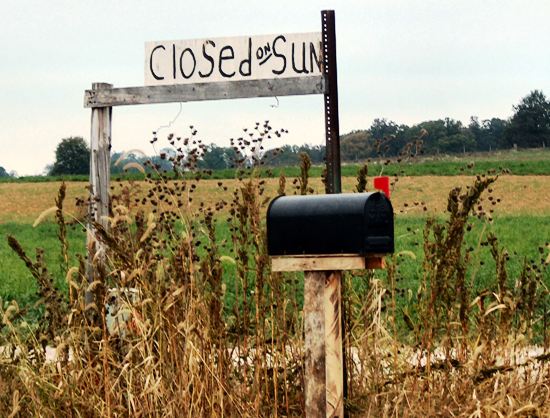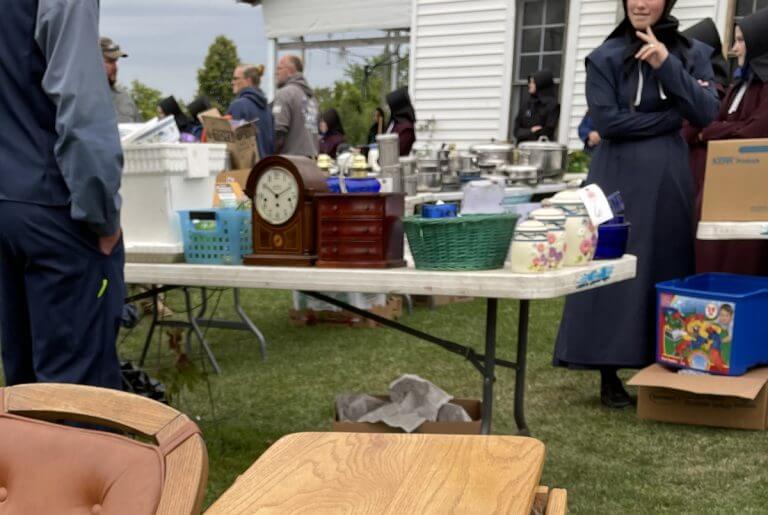13 Money Ideas from the Amish
The good folks at Business Insider published an article yesterday entitled “13 Money Secrets From the Amish“. I’m in it, and frankly that came as a surprise, since I hadn’t spoken to anyone at the site in some time.
My contributions appear to be drawn from info shared 4 years ago, around the time my Amish business book came out.
Lorilee Craker, author of Money Secrets of the Amish, also contributes heavily. Below are the 13 summary points, for more you can read the article in full.

Some of these are sourced to me, and some to Lorilee.
They also tapped this site for info, including a reader post–Tom of NY’s visit to a bulk food store in the Jasper Amish community (unfortunately I’m given credit for Tom’s words in the article!).
Do you agree with all of these? (There’s at least one I have a big quibble with, see if you can guess which). Which seems most important to you? Would you add anything?
13 Amish Money Ideas (via Business Insider)
1. The Amish value experiences more than material goods.
2. They’re huge savers, often setting aside up to 20% of their income.
3. They loathe debt and try to avoid credit cards.
4. Rather than turn to credit, they’d sooner take up a side job when money gets tight.
5. And if they do take out a loan or have debt, they view it as a moral obligation to pay it back in a timely way.
6. Many are experienced tradesmen and their quality wares are in demand.
7. They are extremely savvy small business owners with a 95% success rate.
8. They rarely waste a thing and take recycling to “unbelievable levels.”
9. They buy in bulk whenever possible.
10. They never pay retail and often shop secondhand.
11. Those with money funnel their funds back into the community.
12. They eat like kings but they grow most of their meals themselves.
13. They avoid taking government handouts and are exempt from contributing to Social Security.









Truth in labeling, something the broader American business seems to studiously avoid, would point out that Amish eschewal of Social Security is part of a broader avoidance of government inveiglements. The list of prohibited activities for the Amish also includes participation in law enforcement, military service, and politics.
The above is important to point out because of various and ongoing attempts by rapacious business interests to either emasculate Social Security through privatization or eliminate the program altogether – leaving the disabled and elderly to fend from themselves like the animals in The Brementown Musicians tale.
Like most Americans with an agenda, the business community cherry-picks what it likes about the Amish and either ignores or denigrates the rest. Unlike the Amish, business folks are much better at talking the talk than they are at walking the walk. American business talk, as Edward Bernays famously pointed out almost a century ago, is pure propaganda.
Im going to guess the eat like kings but grow their own food. While many of them do, many are involved in crafts industries (carpentry, etc) and wouldnt have time to grow their own food, excluding a kitchen garden.
I would love to see a post on #8. I enjoy creative ideas on “waste-not/want-not”.
Repurposing
I question #10, “They never pay retail,” because never is a very strong word.
Lily, back in April of 2012, Suzanne Woods Fisher had a post each day about repurposing:
http://suzannewoodsfisher.com/blog/2012/05/winners-from-30-days-of-repurposing/
http://suzannewoodsfisher.com/blog/2012/04/30-days-of-repurposing-day-30/
Here are two bonus links for good measure:
http://notquiteamishliving.com/2013/07/repurposing-old-items-in-order-to-save-money-and-reduce-debt-guest-post-by-tony-standin/
http://www.pinterest.com/jessgaito/diy-repurposing/
I think #10 is untrue. I believe the Amish do shop retail, although they probably keep to less expensive stores like Wal-Mart.
Money Ideas
There are more than one that I would question. But perhaps I would put them in this order.
10. They never pay retail. That is a joke or whatever – do you think they buy at wholesale when they shop at Wal-Mart or at any of the other stores at the mall. They pay retail when the patronize Amish run grocery stores like the huge store in Shipshewana; the Amish dry goods and hardware stores have retail prices.
3. They loathe debt and try to avoid credit cards: If they don’t have credit cards, it is rather because they want to use money not plastic. They probably loathe debt as much as any other “extremely savvy small business owners”. I would suggest many Amish who buy million dollar farms have some debt, even if it is just with other Amish. I will suggest that not many newly married couples have the funds to set up housekeeping and start a farm or business without some debt.
One of the biggest fallacies is to think you can summarize the economic principles and practices of the many different Amish groups with thirteen points. I would suggest that probably some of the key or universal points are not even mentioned.
Amish - Social Security
I believe Amish who work for “outside/English” do pay into Social Security, just as any other employee would.
They do/will not, however, draw the monthly payments when they become eligible to do so.
The Amish who do contribute to Social Security
Good point City, it is true that Amish employed by English are obligated to pay into Social Security. I have heard some may in fact draw Social Security money when eligible (would be tempting after years of paying in), no idea what % but likely a small minority.
Do Amish draw Social Security
The Amish people pay taxes just like every other person does in United States of America, they have to pay social security tax just like everybody else does. collecting Social Security, “no” they don’t. and they all pay taxes, working for English employer, or an Amish employer.
Two Things
First, they do shop retail and pay full price, but they are definitely bargain shoppers.
Second, they don’t really eat like kings, although they eat good, hearty food and lots of it. But they also work harder physically and tend to burn the calories they consume more efficiently. They are more likely to grind the whole cow into hamburger than to set aside steaks, and they are masters of casseroles, using some form of ground meat and everything from the garden.
Don't know...
Erik, my guesses about which one you would disagree with pretty well match what others have stated. I question what is meant by “full retail” — is WM full retail? (I can see arguments for either way). Depending on the answer I could see you disagreeing with that.
With my very limited history of eating around/with the Amish, I can only say that I also question the “eat like kings” part. But on the other hand, as a raised-on-garden-veggies kinda guy myself (and it being right before lunch here), a good mess of purple hull peas, some cornbread, and an ear or two of sweet corn could easily warrant an “eating like kings” label in my book at the moment! (haha)
Kingly Dining
Yes “eat like kings” is sort of a subjective term isn’t it 🙂 If we mean eating like Louis XIV, no probably not, but if we mean eating good, hearty, fresh and usually very tasty food then that may in fact fit the bill.
For that matter I’m not going to say I’ve enjoyed everything I’ve eaten at the Amish table, but 95 times out of 100 the stereotype of Amish cooking as good cooking I’ve found is true 🙂
Retail & "Recycling"
The point on retail was off (#10), for reasons as Osiah states above, but the larger point of being bargain shoppers as Keith notes is a good one. I think maybe this should have been something like “They avoid paying full price when possible” or “They are bargain shoppers”.
Taken at face value the point on recycling might be misconstrued since we largely understand “recycling” as segregating plastic, metal, etc. to be processed and recreated as new goods.
I don’t think Amish as a whole are big participants in conventional recycling programs, but they do “recycle” or rather reuse/re-purpose things often which is what is explained when you read further in the article (and as we saw one example of with the recent calendar-to-envelope post here). https://amishamerica.com/putting-days-gone-by-to-good-use/
On the other hand I guess you could say Amish who sell poly furniture. bird feeders and other products are proponents of recycling in their own way 🙂 (the popular “polywood” plastic lumber material is made from recycled plastic sources like milk bottles)
Good advice for anyone...
The “13 Money Ideas from the Amish” are good advice for anyone. To many people believe they “have to” lead a certain kind of life, “have to” have an expensive apartment. Trying to keep up with the Joneses leads to so many money problems.
One idea I don’t follow from that list is avoiding credit cards. I understand most Amish don’t use them, however, for the rest of us, there is a huge benefit to not having to carry cash around, including safety and protection from theft. Having an automated record of all purchases to view at the end of the month is also useful for budgeting and planning. And certain purchases (plane tickets, internet purchases) essentially can only be made with a credit card.
These benefits, of course, assume one has the discipline to pay the bill on time every month … if one doesn’t, sticking to cash might be better!
I’m Old Order Amish. We do shop retail and get to our local Walmart about every 6 weeks or so, but prefer to shop closer to home in small businesses. We eat well, but some might be surprised at some of the foods we eat. Our family likes Chinese food every now & then, and our pantry does have a lot of store foods in it from cold cereal to fig newtons, coffee, chips, and so on. We are opposed to credit cards, but do a lot of our shopping with a debit card & I do shop online (at work) and use my card for bus tickets, book purchases from Amazon, etc. As for Social Security, I’m employed by a SS exempt company, so I don’t pay SS but I am also not eligible to collect it, which is the way it should be — if you don’t pay in to something, you should not benefit from it. Debt? I’ve got several years to go on our mortgage (which is through the Amish Church Fund mortgage plan) but it’s the only debt we have had beyond the regular monthly charges for feed, etc. If we ever needed to borrow money, I would, but we’ve been blessed to have always been able to hold our own so far.
Mark sounds like a down to earth and sensible way of living. I have a weakness for Chinese food as well which I’ve been indulging lately 🙂
Just to satisfy my curiosity on one of the other points, do you have a sense of how much conventional recycling exists among Amish in Holmes County (and maybe in the County in general? I’m just not sure how pervasive recycling programs are in rural areas for that matter)?
WalMart and the Amish...
Very interesting Mark — thanks for sharing that.
My very first experience with the Amish was in 2010 when my wife and I went to Lancaster Co. PA, with an overnight stop on the way in Holmes Co., OH. While there we made a stop at WalMart (Williamsburg) and were just fascinated that there was a buggy shed there that accommodate several horse/buggies.
Two years later we stayed with an Amish family in Mt. Hope (Holmes Co.), and the lady there explained that WalMart was too far away to get there by horse and buggy, so they would have to hire an Englisch driver. It costs something like $20 for them to make the round trip, so I could see how that would curtail a lot of trips.
Recycling
It’s not a topic I hear discussed a lot. From what I see or hear in our neighborhood there’s a variety of views. We live near Walnut Creek and there are recycling bins there. Some people like our family do take plastics, tins, and a lot of newspaper/ junk mail there to drop off, but I can think of people who put anything that won’t burn out for trash pick-up. Some use paper as mulch in the garden and I have a few friends who rip it up & use paper as bedding. I know our family is not as serious about recycling as some of our non-Amish neighbors, but on the other hand we have a non-Amish neighbor who throws it all in the trash and thinks recycling is for hippies.
Chinese Food
Could add what happened a few years ago when my son & I stopped at the Chinese Restaurant in Millersburg to get a meal to take home. There were tourists there eating and when they saw us place our order the wife said to her husband, “Are they ALLOWED to eat Chinese food?!” When we grinned I think she was embarrassed. We ended up talking a bit with them and they thought it was funny we sometimes order pizza, too. We thought it was funny they think we eat just Amish food made at home.
Amish food restrictions?
That is funny…You mean you didn’t have to check with the bishop first about that egg roll? 😉 Good on you for having a healthy view of their reaction. My impression is a lot of people think that Amish life is more rigidly controlled or restricted, and for lack of a better term “less colorful” than is actually the case.
They are surprised when Amish people know something about websites or cars, or have a taste for foods that aren’t whoopie pies and dumplings 🙂 I guess I can’t blame them given the stereotypes out there (and I would probably think the same way if I hadn’t had the experiences I’ve been fortunate to have had).
Good way to put it, Eric. I work in the public and I’m always surprised at how many tourists seem to think our lives are very controlled and we are unaware of what is going on in the larger society. Our lives are not anywhere near as interesting as all those Amish novels make it sound.
Mark, I suppose I was one of those uninformed folks myself — part of the reason that I bother Erik and others with all the many and intricate questions I post on here from time to time. It’s not valid, but it’s still understandable, that when we (or at least I) think about living with no lights/electricity, some with no running water, outhouses, etc., we often only think of situations like our grandparents or great-grandparents lived in. And I’m pretty sure that my grandparents never had an egg roll or knew the difference between deep-dish and thin crust pizza. 😉 There’s a pretty big learning curve when it comes to grasping other cultures — even when both of those cultures could end up at the same pizza joint for supper. 😉
I laughed out loud when I read your comment, Don. Well said. 🙂 Now there’s a topic for research — do the Amish prefer deep or thin crust pizza! You are right — it is interesting to learn about other cultures.
I'm Guessing Right Now
OK, I skipped past the comments to give a unique answer.
For one, did I not just read that some Amish DO obtain Social Security? If that’s true, then he or she is paying into it. I’m not saying that there isn’t a possible exemption…
I’m sure the Amish buy retail, just not like the English. What about those with telephones, new houses, shoes, etc.? It’s like saying that I breathe air, not oxygen.
The Amish don’t always grow their own meals, or even most of them. Take the NYC Amish, for instance. Can you grow vegetables out on a terrace (only if you are from Green Acres, but since I don’t watch TV anymore…)? So again, the Amish must BUY it from somewhere.
Amish people do often take out loans, etc. After all, they buy houses, buggies, doctor bills, and such.
Not all Amish are carpenters (carpentors? Why should I know: I’m a #Collegestudent) or farmers. According to Erik, there are many Amish tax-preparers (since I’m not around an Amish community, I can’t name another profession, except maybe chiropractors).
That’s about all I could find. Please correct me if I’m wrong, as I really would like to know!
By the way, come visit me at plainpathwaytohim.wordpress.com and/or plainpathwaytohim.tumblr.com.
I’m not picky about beliefs, I’m trying to understand why people dispute certain religious subjects (covering, etc.), so that I may grow spiritually. I also try to help others by listing some of my experiences. So don’t be shy! 🙂
In Christ,
Ada
Amish collecting Social Security?
That is what I have heard to a limited degree on Social Security, but just to emphasize to anyone who comes across this thread, it shouldn’t be taken to mean that the Amish collect Social Security benefits.
The rule is that Amish don’t pay in and don’t receive Social Security, which applies to the majority. After that, a smaller circle who work for English employers do pay in, but don’t receive benefits. Then, a smaller circle yet within that pay in and may be tempted to collect benefits.
In The book The Amish, the authors touch on this as an example of “Amish entanglements with government…increasing” http://books.google.com/books?id=O3lQsi9a2h0C&q=social+security#v=snippet&q=social%20security&f=false
Generally speaking as with other things there are a handful of Amish who operate in ways that aren’t 100% aligned with everyone else (another example might be an Amish businessperson who actually owns a work vehicle rather than leasing one or using an English employee’s) and if it happens quietly, or if a person is marginal (for instance not a prominent or fully able-bodied member of a community) it may be tolerated or simply not known by others.
I wouldn’t say there are “many” (at least I hope I didn’t! 🙂 ) Amish tax preparers, but there are some who do that for a living, often as a service within their own communities.
In the larger communities (Lancaster; Holmes County) you’re apt to find a few, and in medium-sized ones (Nappanee; Arthur IL), probably one or two.
Off the Topic A Little Bit...
By the way, it sounds strange the way I’m saying “the Amish.” I’m not trying to make them sound like oddities, because they aren’t. Amish people are around us (though separate from the world).
Still waiting for a scholarship for an Arkansas, Tennessee, etc. vet school. You know, close to a Plain community. (I’ve talked about this topic before.) My options of witnessing a Plain community while attending vet school is kind of limited, additionally because I cannot stand temperatures less than 65 degrees (very, very low tolerance for the cold!). Seriously, I feel like I’m in the middle of a blizzard WHILE IN THE MEAT AISLE!
Smiles,
Ada
TYPICAL CONDUCT concerning money
Thank you for putting this topic also.
The ideas are all well definded and abstracted.
And, in their abstraction, they are fully true of a typical German behavioral culture of roughly 150-100 years ago.
There could possibly some more general rules, but this is a nice start anyhow.
Much of these end 19th century values have shifted and changed in several historical “periods” or “waves”, industrial revolution, wars, radio and tv, political regimes, PC and internet, etc.
I agree with Oliver
My mother’s ancestors were German speaking people from Switzerland and the Alsace, a very conservative group indeed. Though they emigrated to the US in general, and Texas in particular, in the period between 1848 1nd about 1853 they maintained a lifestyle that was considerably more conservative (at least in how they managed their money) than did the mainstream population; right up through my mother’s generation. I often thought, that though they were primarily Catholic or Lutheran, her relatives managed their personal finances more like what I understood the Amish to do than anyone else that I could think of.
I started managing my mom’s money for her about 15 years ago, when she was almost 80 years old, and I was surprised at the amount of assets that she had in relation to the really modest income that both her and my father had earned in their working lives. He died at a relatively early age, nearly 40 years ago so I know that for at least 25 years she had managed her affairs without any input from anyone.
After she passed away last fall I was commenting to my sister that I was somewhat surprised that we never had to come up with any real significant amount of money to support her, when many of my friends had commented that caring for an elderly parent had been a real financial struggle. Most of their parents had outlived their assets; her assets had outlived her, though. My sister replied: “Well, she was very frugal; she was very German”.
I look at this list and realize that she probably had even more in common with the “average” Amish person than she did with the “average” American person than I had previously thought.